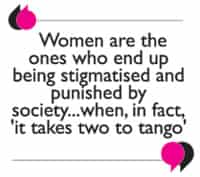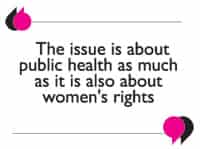Late last year the discovery of more than 2,000 foetuses in a temple publicly revealed an uncomfortable and unsurprising truth: each year, abortion is a reality for tens of thousands of women and their partners in Thailand. Although there is a lack of definitive data, conservative estimates suggest that well over 300,000 abortions occur every year here. This is an extrapolation based on known cases, a small percentage of the overall total. A good proportion of these abortions are unsafe, performed by unlicensed people, and perhaps that is one of the most distressing aspects of what is happening; there are women in Thailand dying due to the dangers involved with unsafe abortion. Furthermore, this is made even more tragic because it is an entirely preventable situation and is happening despite all of our medical advances.
Abortion is a controversial issue throughout the world, and clearly it is not just limited to Thailand. Advocates for the right to access abortion services often invoke the concept of women’s rights, and with good reason. At the core of this contentious issue is the undeniable links to a woman’s body, a woman’s ability to reproduce and to her sexuality. Just like most other societies around the world, Thailand is an inherently patriarchal society, with widely understood standards about what is considered acceptable female behaviour. These same standards do not apply to men, and plenty of male sexual activity seems to pass with little comment. Women are the ones who end up being stigmatised and punished by society when, in fact, ‘it takes two to tango’.
One common thread found in discussions about abortion here is the idea that it is ‘illegal’. But perhaps it makes more sense to talk about the laws as being restrictive because there are a range of circumstances when abortion is permissible, if performed by an appropriate service provider: to save the life of the woman; to preserve physical health; to preserve mental health; rape; incest, and foetal impairment. The law is open to interpretation, and interpretations vary widely; but it is fair to say that these restrictive laws do not go far enough to protect the well-being of women. Thai advocates continue to push for the laws to be liberalised and the ‘temple foetus’ scandal reinvigorated this area of work because it’s clear that changes are urgently required.

‘Legally the civil law states quite clearly that legal status of a person starts once they are born. This really should be the end of the conversation. But in the penal code (criminal law), it is stipulated that abortion is a crime. It has to go back to civil law. A foetus is still a part of a woman’s body without any legal status. That is the law.’
So women are liable under criminal law in Thailand and can be fined and/or imprisoned for having an abortion. This surely begs the question: is this punishment warranted? In addition, abortion law in Thailand is actually based on the European model of the nineteenth century, introduced by a European advisor to King Rama V. Prior to this, there was no legislation relating to abortion.
Any discussion about abortion in Thailand also needs to reference Buddhism, as it is often cited as one of the main reasons why abortion is not allowed. The religious context clearly reinforces the taboo and links it to the idea of ‘sin’; but given that other nearby countries with significant Buddhist populations such as Cambodia and Vietnam have liberal laws relating to abortion, there is good ground to argue that the restrictions imposed relate to factors that extend far beyond religion.
Taking a step back from abortion, and looking at the issue of family planning more broadly, many people may not be aware that Thailand is a rather famous case study about how to successfully promote family planning strategies. Mechai Viravaidya aka ‘Mr. Condom’ is known around the world for helping to dramatically decrease Thailand’s birth rate. Through various innovative strategies that started in the 1970s, many of which were infused with the Thai sense of fun, communities were encouraged to help promote condoms and birth control. As a result of the wide scale and ongoing campaign, the number of children in Thai families went from an average of seven to two in a reasonably short space of time. This was a positive change because increased family planning leads to greater economic and social progress. People are better able to lift themselves out of poverty when women have more control over how many children they have, and are allowed greater access to education for themselves and their children. Empowered women ultimately lead to empowered communities.
I saw Khun Mechai speak in 2004 at a regional roundtable in Kuala Lumpur, which was the ten year follow up to the International Conference on Population and Development (ICPD). The ICPD was a momentous international meeting that occurred in Cairo in 1994 where 179 countries agreed that population control and development are inextricably linked, and necessary for both individual advancement and national development. For me, attending the roundtable was an eye-opening experience. Having been born and raised in Australia, and working in the area of sexual and reproductive health at the time, I didn’t have much sense that the widespread availability of sex education and family planning services in my home country was more the exception than the norm in this region. When I was speaking in front of a large audience composed of meeting participants, I fielded questions I found surprising such as, “Doesn’t sex education just encourage young people to have sex?” Yet moving forward in time, comprehensive sex education in schools is still not found in many countries in Asia. The increasing rate of early (and unwanted) pregnancy in Asia, particularly Thailand, is linked to many factors, and this includes a lack of knowledge around how one’s body works and dealing with one’s sexuality. Declaring that young people are being more promiscuous doesn’t address the root of the problem in the slightest. And if punitive abortion laws are meant to deter teen pregnancy, it’s clearly not working.

The fact of the matter is, instead of all women being able to terminate unwanted pregnancies safely and with appropriate care in Thailand, these women are part of Thailand’s figures on morbidity and mortality in relation to maternal health. This issue is about public health as much as it is also about women’s rights. The good news for Thailand is that changes are afoot, and there are countless people working together to reform the restrictive laws. Supporters include various people working for the government, the medical fraternity and the Choice Group, an alliance of 49 organisations working on this issue and related ones. In Bangkok in January 2010, the First International Congress on Women’s Health and Unsafe Abortion was held, and there was a large contingent of key players in Thailand in attendance as well as international participants. From that congress came the ‘Bangkok Declaration’ which stated, among other things, that “a safe and appropriate method of termination of pregnancy should be made available to every woman requesting to end a pregnancy”. Right at this moment a Reproductive Health Bill is under consideration by Thai parliament, though many feel it doesn’t go far enough. Although on paper it looks good, if the bill passes, it’s not clear how the laws would be enforced in practice.
Alongside these critical high-level discussions, it’s worth noting that abortion as a procedure in itself has also radically changed. The improvement of medical abortion as a procedure has made it possible for abortion to occur safely through the use of appropriate medication. Medical abortions can even be conducted in the privacy of a woman’s home, especially when under the supervision of an appropriate service provider. This includes online-based services such as Women on Web, which helps women by providing information and one-on-one support about medical abortion. They are particularly helpful for women who are unable to access services due to restrictive laws or because they live in an area with limited abortion care available. A few months ago, Women on Web launched their service in Thai.
Dr. Anna Whelan is Regional Director for the International Planned Parenthood Federation (IPPF) in the region, and the IPPF advocates strongly on access to safe abortion. When I spoke to her about this issue recently in Bangkok, she neatly summed up the situation for women everywhere:
“We must work together to keep the focus on meeting women’s needs sensitively and with real caring for her situation. We must keep the spotlight on the harm that can be caused if we lose that focus. We need our politicians, our health services, our community leaders to support women in difficult times. A woman’s body should not be the battleground for political and religious ideologies.”
Mechai Viravaidya’s TEDtalk:
www.ted.com/talks/lang/eng/mechai_viravaidya_how_mr_condom_made_thailand_a_better_place.html
Women On Web: www.womenonweb.org
Asia Safe Abortion Partnership: www.asap-asia.org
IPPF East and South East Asia and Oceania Region: www.ippfeseaor.org/en
